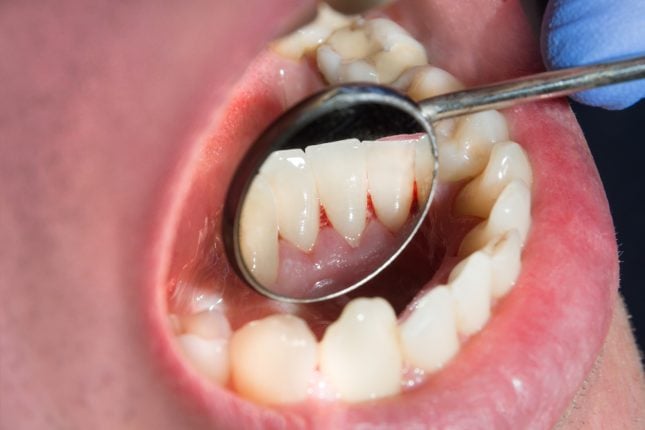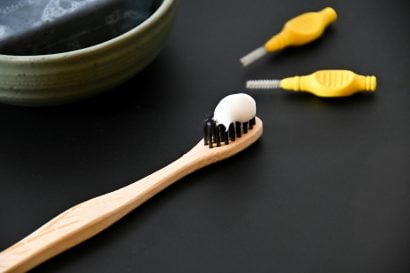How can I get rid of bad breath?
Persistent bad breath often comes from a buildup of bacteria on the tongue, between teeth, and under the gum line. Daily brushing, flossing, and tongue cleaning are essential to remove these odor-causing particles. In Bangkok, professional cleanings and specialized treatments can further help — especially if your bad breath is linked to gum disease or dry mouth. Staying hydrated, avoiding tobacco, and scheduling regular dental visits will support fresher breath in the long term.
Why Does My Breath Smell ?
Halitosis is the medical term for bad breath, and it affects millions worldwide—including many people in Bangkok who notice their breath smells more in the heat. While the occasional bad smell is normal, chronic bad breath can signal an underlying health issue or poor oral hygiene.
About 90% of cases are caused by bacteria in your mouth, which break down food particles left behind after meals. This releases sulfur compounds that create strong odors. The remaining causes are linked to health conditions like acid reflux, diabetes, or chronic sinus infections.
When your mouth doesn’t produce enough saliva, bacteria multiply. This buildup of microorganisms is a common cause of persistent odor.

Dentist consultation at The Smile Bar.
Symptoms of Halitosis: How to Recognize When Breath Becomes a Problem
Sometimes, it’s hard to tell whether occasional odor is normal or a sign of something more serious. The symptoms of halitosis often go unnoticed until someone points them out—or you start to feel self-conscious about how your breath smells. The most obvious symptom is a persistent bad taste in your mouth, especially in the morning or after eating strong foods like garlic and onion. You might also notice a dry, coated feeling on your tongue or gums, which can indicate the cause of your bad breath is bacteria.
Other symptoms and causes include a sour or metallic taste linked to gastroesophageal reflux disease, dryness from mouth breathing, or frequent use of breath mints without proper cleaning. In more advanced cases, gum disease or infection may cause your gums to bleed, swell, or feel tender when you brush.
If you notice that your breath is caused by poor oral hygiene or that your efforts to stay fresh don’t last, it could be time to consult a professional. At The Smile Bar Bangkok, we help you pinpoint the cause of bad breath and design a treatment plan that restores comfort and confidence.
Common Causes of Bad Breath: Plaque, Gum Disease, and Tongue Coating
One of the most common causes of bad breath is plaque. Without good oral hygiene, plaque hardens into tartar, irritating the gums and leading to gingivitis or advanced gum disease. These symptoms and causes often go unnoticed until the odor becomes obvious.
A coated tongue is another frequent source of bad breath. Even if you brush regularly, forgetting to clean your tongue leaves a film where germs that cause bad breath thrive. Food particles and bacteria stuck between teeth or under the gum line also decompose, making your breath smell bad.

Gingivitis Dental Effect Example.
Lifestyle Triggers: Diet, Dry Mouth, and Bad Habits
Certain bad habits and lifestyle factors directly affect your breath. Smoking and chewing tobacco cause dry mouth and add strong-smelling chemicals. Popular Thai dishes with garlic and fermented sauces can result in bad breath that lingers.
A mouth is dry more often in Bangkok’s humid climate because people forget to drink water. When there isn’t enough saliva, acids and debris remain. If you suffer from acid reflux, the taste in your mouth can be sour, and the odor stronger.
Bangkok Considerations: Spicy Foods and Dehydration
Traditional cuisine, hot weather, and air conditioning combine to challenge saliva production. Even frequent use of breath mints can only mask the odor without solving the problem.
Maintaining a consistent oral hygiene routine, staying hydrated, and avoiding smoking are essential to keep your breath fresh in this environment.
How The Smile Bar Treats Bad Breath Effectively
At The Smile Bar Bangkok, we offer professional teeth cleaning and tongue care to address the most common causes of bad breath—plaque buildup, tartar, and bacterial coating on the tongue.
During your visit, our trained hygienists perform a deep clean that includes scaling, polishing, and thorough tongue cleaning. This helps eliminate the odor-causing bacteria and promotes a healthier, fresher smile.
For those looking to enhance both color and hygiene, our LED teeth whitening treatment can also help reduce surface stains—leaving your mouth feeling cleaner and brighter.

Whitening results.
Proven Prevention: Daily Care for Fresh Breath
To prevent bad breath :
-
Brush and floss twice daily.
-
Clean your tongue thoroughly.
-
Use an alcohol-free mouth rinse.
-
Drink plenty of water to make enough saliva.
-
Avoid tobacco and limit spicy foods.
Professional cleanings every six months remove tartar and reduce the possible causes of odor.
When to See Your Dentist
If you still struggle with odor, you may be dealing with halitosis or bad breath due to an underlying health condition. Tonsil stones, sinus issues, reflux, or diabetes can lead to bad breath that brushing won’t fix.
See your dentist to determine the cause of your halitosis and find the right treatment for halitosis. At The Smile Bar, we help you feel confident with every breath.
Ready to enjoy fresh breath?
Schedule a visit to The Smile Bar Bangkok today for personalized care in our clinic designed for comfort and results.

The Smile Bar interior.
Conclusion – TL;DR
Bad breath is usually caused by bacteria, plaque, and dry mouth—but it can be treated and prevented. Brush and floss daily, clean your tongue, stay hydrated, and avoid tobacco. At The Smile Bar Bangkok, our expert cleanings and targeted treatments help eliminate odor at the source, leaving your breath fresher and your confidence restored.
Frequently Asked Questions
What breath smells indicate illness?
- Certain breath odors can signal health issues beyond the mouth. A fruity or sweet smell may point to uncontrolled diabetes, while a sour or metallic taste can come from acid reflux. If your breath smells unusually strong or persists despite good hygiene, consult a professional to rule out systemic conditions.
What causes bad breath even after brushing?
- If brushing doesn’t resolve the odor, bacteria may be hiding on your tongue, under your gums, or in plaque deposits. Other culprits include dry mouth from dehydration or medication, sinus infections, or digestive problems. Professional evaluation can help pinpoint and treat the source effectively.
What health conditions can cause bad breath?
- Chronic bad breath can be linked to conditions like gastroesophageal reflux disease (GERD), diabetes, chronic sinus infections, or liver and kidney disorders. These systemic causes often require medical treatment alongside dental care to fully resolve the odor.
What causes bad breath in the morning?
- Morning breath happens because saliva flow decreases overnight, allowing germs to grow and release sulfur compounds. Sleeping with your mouth open, dehydration, and consuming strong-flavored foods before bed can make the odor worse.
Can chronic bad breath be cured?
- Yes—most cases improve significantly with a consistent oral hygiene routine and professional care. If your bad breath is due to underlying health issues, treating those conditions is key to lasting results. Many Bangkok residents find that combining daily habits with dental treatments provides the best outcome.
Are there different types of halitosis?
- Halitosis can be classified as transient (temporary, such as morning breath) or chronic (persistent over time). Chronic halitosis is often caused by gum disease, tongue coating, or medical conditions, while transient halitosis usually results from food or dehydration.
What is the main cause of bad breath?
- About 90% of cases come from microorganisms in the mouth breaking down food particles and proteins, producing foul-smelling sulfur compounds. Other causes include dry mouth, gum disease, and certain medical conditions that affect digestion or metabolism.










